Dragon Boat Festival at Yue Opera Town
The Dragon Boat Festival, which falls on the 5th day of the 5th month on the Chinese Lunisolar Calendar, is the first Chinese traditional festival to be included in the UNESCO list of world intangible heritage. There are various legends about the origin of the festival. The best received is that the festival is in commemoration of Qu Yuan, a great poet of the Warring States Period (340-278 BC). In the ancient Baiyue region, tribes worshiping dragons as totems usually offered sacrifices on this day, and thus the tradition of dragon boat racing was established.
The Dragon Boat Festival fell on June 7 this year, one day before China’s “Cultural Heritage Day” which is annually celebrated on the second Saturday in June. Yue Opera town launched a series of events on the theme of “Meeting in the Town in Celebration of the Intangible Heritage ‘Dragon Boat Festival’”.
Event I: Zhejiang Taishun Puppet Show
Taishun is located in the south of Zhejiang Province. Fleeing from wars that led to the fall of the Song Dynasty and the birth of Yuan dynasty at the end of the 13th century, many artists from Lin’an (Hangzhou), capital of the Southern Song Dynasty, settle in the south of Zhejiang. Besides, the previous immigrants from Quanzhou of Fujian Province introduced string puppet to Wenzhou. Therefore, Taishun puppet shows reached zenith from the 14th to the 19th century (Ming and Qing dynasties). Taishun puppets, in such various varieties as string puppet, stick-controlled puppet, plastic puppet performing on water surface and spitting-fire puppet, staged stories including legends and historical drama. Families passed on crafts and skills of puppet show for over ten generations. The local craftsmen are not only well-known for staging puppet shows, but also for puppet-making skills.
During the Dragon Boat Festival, puppet artists from Taishun performed dramas such as “the Departure of the Butterfly Lovers” and the “True and False Monkey King” with the string puppets.
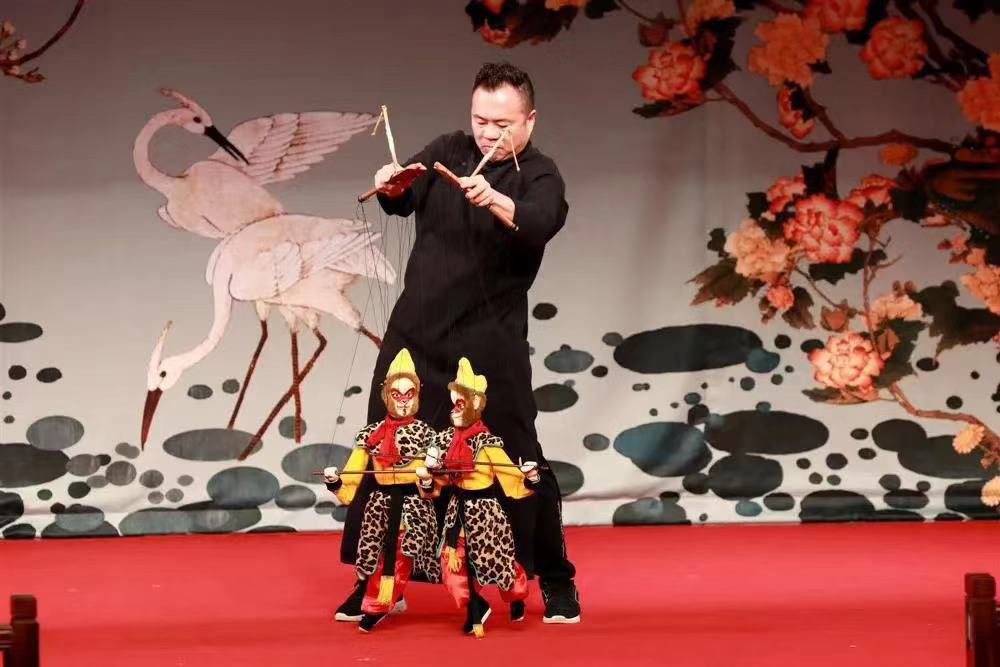
Event II: Yuyao Puppet Wrestling
The century-old puppet wrestling is believed to originate from in Simen Town, Yuyao City, Zhejiang Province and is locally called “Tumbling Woodenhead”. A pair of human-sized puppets face each other, with arms wrapping around each other’s shoulders. To the music played by small gongs, cymbals, drums and other musical instruments, they played all kinds of moves, such as “staring at each other like two tigers”, “diving towards the enemy like goshawk catching fledging”, “attacking like a crane with its beck”, “moving forward to push the other backward”, “rolling to the left and right”, “standing on one foot”, “sweeping the leg to tumble the rival”, “pouncing on the rival like a hungry wolf on a sheep” and “18 rolls on the ground”.
Puppet wrestling used to be performed at temple fairs. It was well received for its humorous martial arts moves. During the whole show, you will see two puppets wrestling, rolling and moving forward and backward. Till the end of the performance when the covering cloth is lifted, you will find unexpectedly that there is only one performer hiding in cloth of to operate the conjoined puppets by his intuition and sense of touch.

Event III: Eastern Zhejiang Traditional Operas Listed as Intangible Heritage
Ou Opera of Wenzhou, Wu Opera of Jinhua and Yao Opera of Yuyao were included in the national intangible cultural heritage list in 2008. The famous excerpts of the three operas are respectively “Provoking Riots at a Boite”, “Romance of a Monk and a Nun” and “Breaking Lover’s Window”.
Though all located in the eastern Zhejiang, each opera has its own local features. Both Ou Opera and Wu Opera are multi-tone, but the latter boasts a longer history and its unique features. Yao Opera is part of “Tanhuang”, evolving from such folk songs and dances as the “Trotting Horse Lantern”, “Land Boat” and “Tea-picking Basket”.
The Yue Opera Town located in Shengzhou, the birthplace of female Yue Opera, is dedicated to protecting and carrying forward the traditional operas. Performance is staged at the ancient opera house to give the audience a taste of the traditional operas in its original settings and forms. Ou Opera, Wu Opera and Yao Opera are like neighbors and relatives born and living next to one another but with distinctive features. In the future, more varieties of operas will be staged at the ancient opera house in the Yue Opera Town.
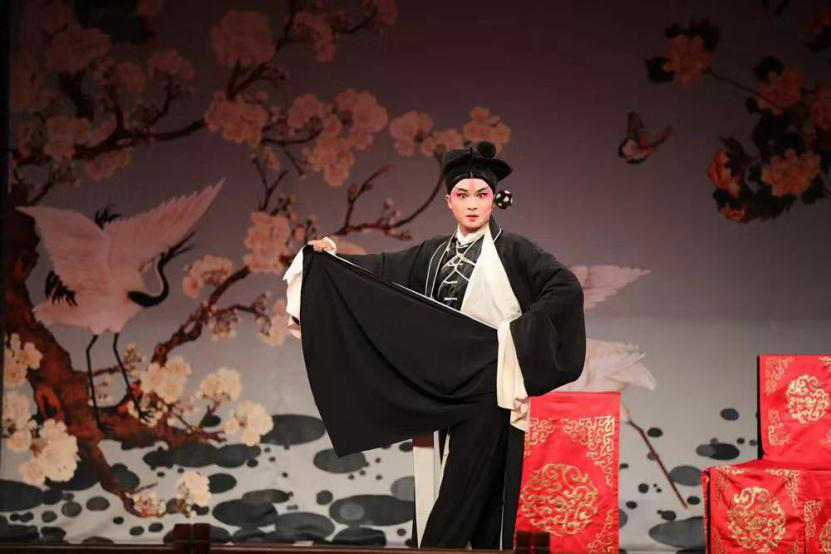
Ou Opera “Provoking Riots at a Boite”, with Zhang Dasheng as Shi Xiu.
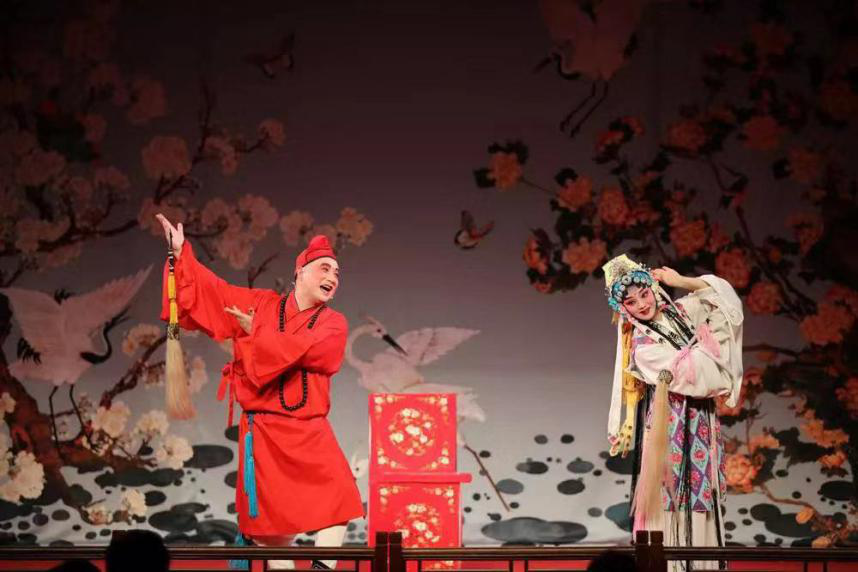
The Wu Opera “Romance of a Monk and a Nun”, with Fang Yi as the young monk and Yan Ruonan as the young nun.

Yao Opera “Breaking Lover’s Window”, with Lu Yiqing as Zhang Guiying and Zhou Tao as Yi Yuanqing.
Event IV: Shengzhou Intangible Cultural Heritage Crafts
Shengzhou bamboo weaving was included in the national intangible cultural heritage list in 2006. Shengzhou clay sculpture was included in Zhejiang intangible cultural heritage list in 2007. Ancient dead-wood carving was included in Shengzhou intangible cultural heritage list in 2018. All these three crafts boast local features of Shengzhou. Besides, bamboo carving, Yuehu, stone painting, Huangze opera costumes and purple sand ceramics are all telling the unique stories of Shengzhou. It’s worth noting that other the folk crafts, such as weaving flowery belts and hooping barrels, are no longer relevant to real life as the flowery belts and wooded barrels are seldom used in daily life.
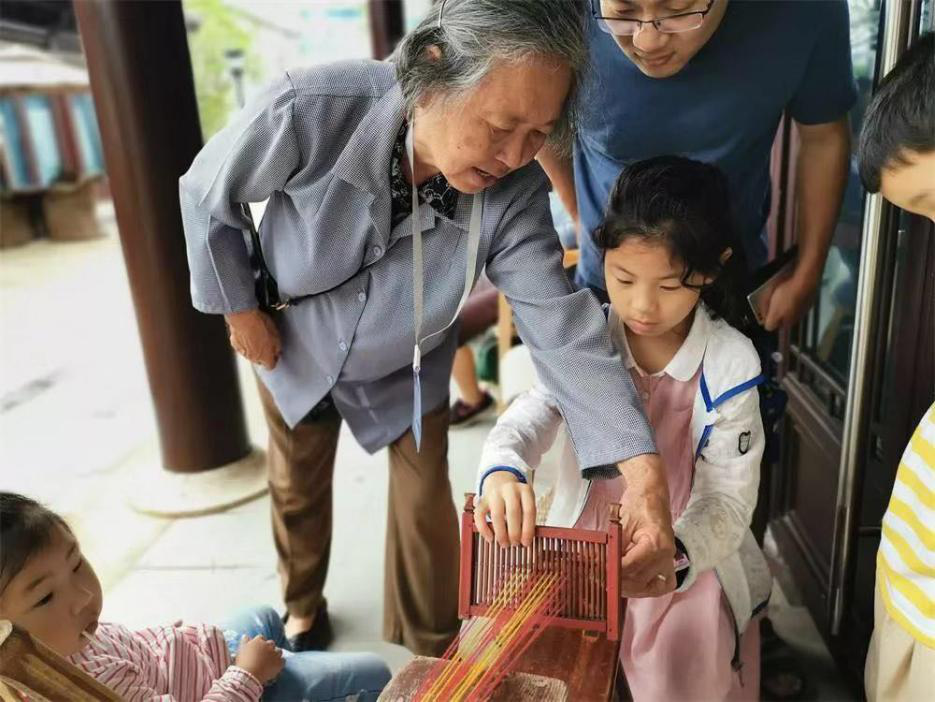
Guidance by Ms. Liang Guoqin, child tourists are attempting at weaving flowery belts.
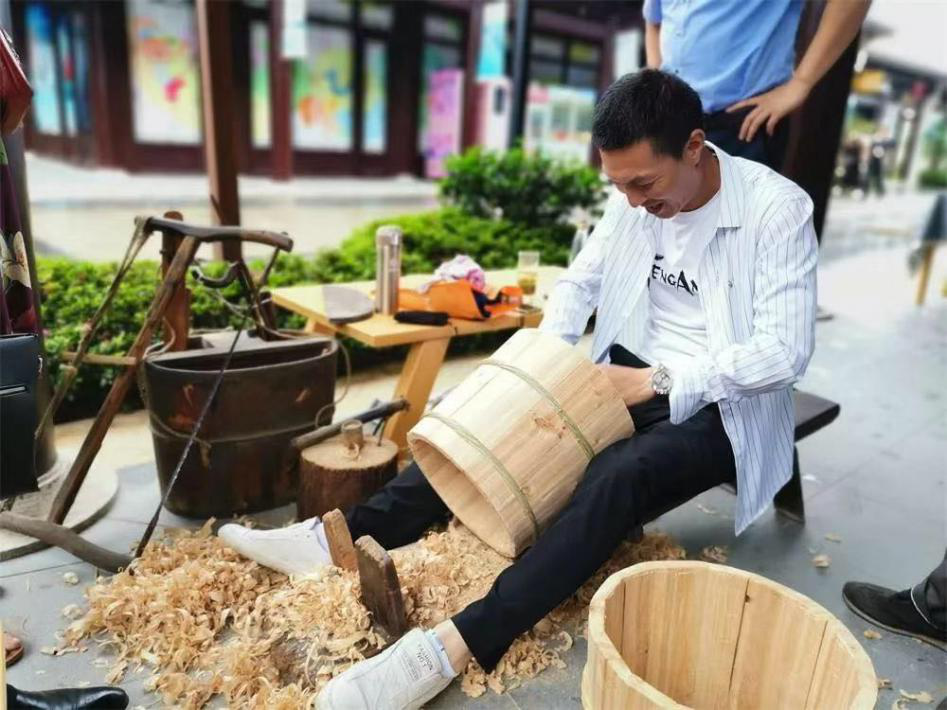
A tourist is experiencing hooping barrels.
It caters to the unique Chinese cultural, spiritual, value, psychological and emotional enjoyment to celebrate the Dragon Boat Festival and go through the rituals. Since the second Saturday in June was chosen as the “Chinese Cultural Heritage Day” in 2006, “enhancing the protection of cultural heritage” has been the highlight of relevant events. This year’s “Heritage Day” followed the Dragon Boat Festival and thus the theme was identified as meeting in town to celebrate the intangible heritage.
